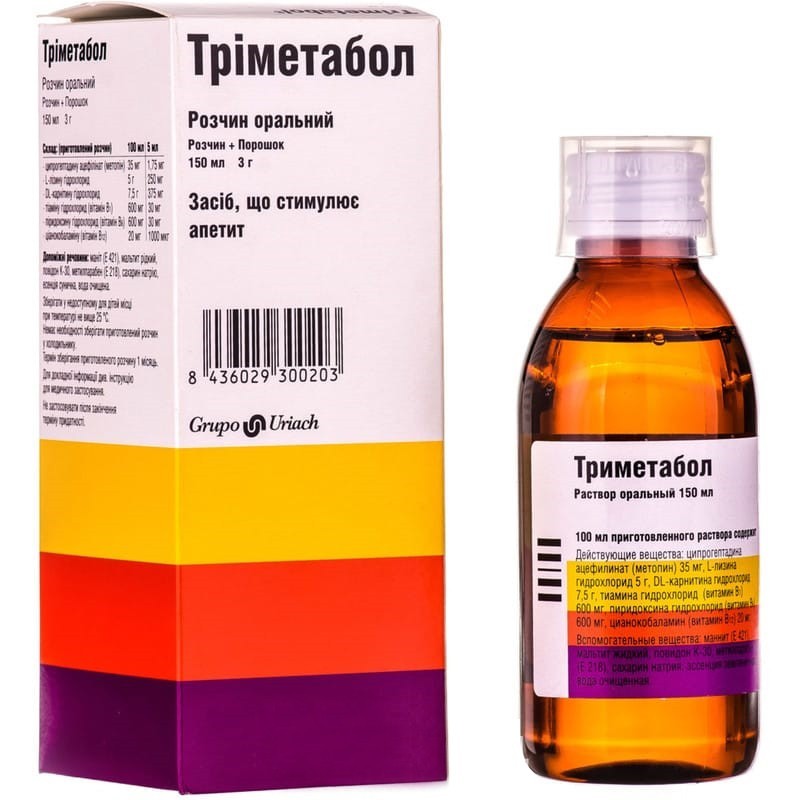



 Secure and encrypted payment processing
Secure and encrypted payment processing We ship to over 40 countries including the USA, UK, Europe, Australia and Japan
We ship to over 40 countries including the USA, UK, Europe, Australia and Japan Guaranteed refund or reship if you haven't received your order
Guaranteed refund or reship if you haven't received your orderThe main component of the drug - cyproheptadine acephillinate (metopine) - has the properties of a serotonin antagonist, stimulates appetite, exerting an effect on the hypothalamus. the drug has a blocking effect on calcium channels. often in children with reduced appetite, hypotension or digestive disorders occur, so stimulating only the center of hunger can cause a mismatch between food intake and the bodys ability to digest and absorb it. to prevent this, the drug contains carnitine, which stimulates the production of gastric juice and pancreatic secretion and provides optimal conditions for the absorption of vitamins, minerals and nutrients.
For complete assimilation of food, it is necessary to ensure the optimal functioning of enzyme systems. Therefore, the composition of the drug includes a complex of vitamins (B1, AT6, AT12), playing the role of coenzymes in the metabolism of lipids, proteins and carbohydrates and contributing to their assimilation at the cellular level.
L-lysine supplements the formula of the drug, is the basis for protein biosynthesis, has a non-hormonal anabolic effect.
Due to its balanced composition, the drug improves appetite and helps to increase body weight.
The drug is well absorbed after oral administration, Cmax achieved 4 hours after administration. Data on distribution in the body and penetration into breast milk are not available.
It is excreted in the urine within 12 hours after taking the drug.
Stimulation of appetite; as a non-hormonal anabolic agent.
Preparation of solution: pour the contents of the package into a bottle with a solution, close the bottle and shake until the powder is completely dissolved. the prepared solution completely retains its properties for 1 month.
Dosage: children aged 2-3 years - 2.5 ml 3 times a day; children aged 3–6 years - 5 ml 3 times a day; children over 6 years old and adults - 5-10 ml 3 times a day.
The duration of treatment is determined by the doctor and depends on the individual characteristics and needs of the patient. Typically, the drug is used for 2 months. It is recommended to take the drug 30-60 minutes before the main meal.
Hypersensitivity to the active substance or any other component of the drug; exacerbation of BA, glaucoma, peptic ulcer, pyloric stenosis, conditions that are accompanied by urinary retention (symptomatic prostatic hypertrophy, bladder neck contracture); simultaneous use of MAO inhibitors. do not use in elderly patients and malnourished patients.
At the beginning of treatment, sedation and drowsiness often occur, which usually disappear on the 3-4th day of treatment.
The following side effects from reports of antihistamines may occur.
From the side of the central nervous system and sensory organs: sedation, drowsiness, dizziness, impaired coordination, confusion, loss of consciousness, anxiety, excited state, accommodation disturbance (mydriasis), diplopia, hallucinations, tremor, irritability, insomnia, paresthesia, neuritis, headache pain, weakness, aggressive behavior, convulsions, euphoria, hysteria, tinnitus, acute labyrinthitis.
Allergic reactions: anaphylactic shock.
On the part of the skin and subcutaneous tissues: rashes and swelling of an allergic nature, sudden sweating, urticaria, photosensitivity.
From the blood system: hemolytic anemia, leukopenia, agranulocytosis, thrombocytopenia.
From the cardiovascular system: arterial hypotension, tachycardia, extrasystole.
On the part of the respiratory system: the formation of a thick bronchial secretion, shortness of breath, dryness in the nose and throat, nosebleeds.
Gastrointestinal disturbances: dry mouth, nausea, vomiting, anorexia, discomfort in the epigastric region, diarrhea, constipation, cholestasis, hepatitis, jaundice, liver failure.
From the genitourinary system: frequent urination, difficulty urinating, urinary retention.
Other: chills.
It is necessary to use the drug with caution in case of history of b, an increase in intraocular pressure, hyperthyroidism, cardiovascular diseases, ag.
Very rarely, prolonged antihistamine therapy can lead to pathological changes in the blood.
The composition of the drug includes an auxiliary substance methylparaben (E218), which can cause allergic reactions, possibly of a delayed type.
Due to the presence of liquid maltitol in the preparation, patients with rare hereditary fructose intolerance should not use the drug.
During pregnancy and breastfeeding. Do not use the drug during pregnancy and lactation due to the lack of sufficient data on the safety of use.
Children. Used in children over the age of 2 years.
The ability to influence the reaction rate when driving vehicles and working with other mechanisms. In cases where during treatment with the drug dizziness, drowsiness, impaired coordination, etc. are noted, you should refrain from driving vehicles and working with other mechanisms.
Pyridoxine reduces the antiparkinsonian activity of levodopa and the neurotoxic effect of isoniazid. thiosemicarbazone and fluorouracil cancel the action of vitamin b1, being its antagonists. antacids slow down the absorption of vitamin B1.
The simultaneous use of cyproheptadine with antidepressants, selective inhibitors of serotonin reuptake, can lead to a relapse of depression.
With the simultaneous use of cyproheptadine with tricyclic antidepressants, the latter potentiate anticholinergic effects and enhance the inhibitory effect on the central nervous system.
MAO inhibitors can potentiate and prolong the anticholinergic effect of cyproheptadine.
It is necessary to use the drug with caution in combination with sleeping pills, sedatives, anxiolytic drugs, as well as with alcohol due to the inhibitory effect on the central nervous system.
In case of an overdose, an increase in the manifestations of adverse reactions is possible. overdose of the drug in children can cause excitement from the central nervous system in the period from 30 minutes to 2 hours after application. however, in case of an overdose, measures must be taken to accelerate the removal of the drug from the body: gastric lavage, forced diuresis. symptomatic therapy.
At a temperature not exceeding 25 ° C. There is no need to store the prepared solution in the refrigerator.